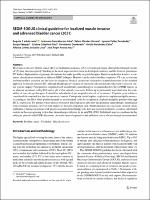| dc.contributor | Vall d'Hebron Barcelona Hospital Campus |
| dc.contributor.author | Pérez-Valderrama, Begoña |
| dc.contributor.author | González‑del‑Alba, Aránzazu |
| dc.contributor.author | Morales Barrera, Rafael |
| dc.contributor.author | Peláez Fernández, Ignacio |
| dc.contributor.author | Vázquez, Sergio |
| dc.contributor.author | Caballero Díaz, Cristina |
| dc.date.accessioned | 2022-08-12T08:25:57Z |
| dc.date.available | 2022-08-12T08:25:57Z |
| dc.date.issued | 2022-04 |
| dc.identifier.citation | Valderrama BP, González-Del-Alba A, Morales-Barrera R, Peláez Fernández I, Vázquez S, Caballero Díaz C, et al. SEOM-SOGUG clinical guideline for localized muscle invasive and advanced bladder cancer (2021). Clin Transl Oncol. 2022 Apr;24:613–24. |
| dc.identifier.issn | 1699-3055 |
| dc.identifier.uri | https://hdl.handle.net/11351/7997 |
| dc.description | Bladder cancer; Muscle-invasive; Urothelial |
| dc.description.abstract | Most muscle-invasive bladder cancer (BC) are urothelial carcinomas (UC) of transitional origin, although histological variants of UC have been recognized. Smoking is the most important risk factor in developed countries, and the basis for prevention. UC harbors high number of genomic aberrations that make possible targeted therapies. Based on molecular features, a consensus classification identified six different MIBC subtypes. Hematuria and irritative bladder symptoms, CT scan, cystoscopy and transurethral resection are the basis for diagnosis. Radical cystectomy with pelvic lymphadenectomy is the standard approach for muscle-invasive BC, although bladder preservation is an option for selected patients who wish to avoid or cannot tolerate surgery. Perioperative cisplatin-based neoadjuvant chemotherapy is recommended for cT2-4aN0M0 tumors, or as adjuvant in patients with pT3/4 and or pN + after radical cystectomy. Follow-up is particularly important after the availability of new salvage therapies. It should be individualized and adapted to the risk of recurrence. Cisplatin–gemcitabine is considered the standard first line for metastatic tumors. Carboplatin should replace cisplatin in cisplatin-ineligible patients. According to the EMA label, pembrolizumab or atezolizumab could be an option in cisplatin-ineligible patients with high PD-L1 expression. For patients whose disease respond or did not progress after first-line platinum chemotherapy, maintenance with avelumab prolongs survival with respect to the best supportive care. Pembrolizumab also increases survival versus vinflunine or taxanes in patients with progression after chemotherapy who have not received avelumab, as well as enfortumab vedotin in those progressing to first-line chemotherapy followed by an antiPDL1/PD1. Erdafitinib may be considered in this setting in patients with FGFR alterations. An early onset of supportive and palliative care is always strongly recommended. |
| dc.language.iso | eng |
| dc.publisher | Springer |
| dc.relation.ispartofseries | Clinical and Translational Oncology;24 |
| dc.rights | Attribution 4.0 International |
| dc.rights.uri | http://creativecommons.org/licenses/by/4.0/ |
| dc.source | Scientia |
| dc.subject | Quimioteràpia combinada |
| dc.subject | Bufeta - Càncer - Tractament |
| dc.subject.mesh | Urinary Bladder Neoplasms |
| dc.subject.mesh | Neoadjuvant Therapy |
| dc.title | SEOM-SOGUG clinical guideline for localized muscle invasive and advanced bladder cancer (2021) |
| dc.type | info:eu-repo/semantics/article |
| dc.identifier.doi | 10.1007/s12094-022-02815-w |
| dc.subject.decs | neoplasias de la vejiga |
| dc.subject.decs | tratamiento neoadyuvante |
| dc.relation.publishversion | https://doi.org/10.1007/s12094-022-02815-w |
| dc.type.version | info:eu-repo/semantics/publishedVersion |
| dc.audience | Professionals |
| dc.contributor.organismes | Institut Català de la Salut |
| dc.contributor.authoraffiliation | [Valderrama BP] Medical Oncology Department, Hospital Universitario Virgen del Rocío, Sevilla, Spain. [González-Del-Alba A] Medical Oncology Department, Hospital Universitario Puerta de Hierro Majadahonda, Madrid, Spain. [Morales-Barrera R] Servei d’Oncologia Mèdica, Vall d’Hebron Hospital Universitari, Barcelona, Spain. Vall d’Hebron Institute of Oncology (VHIO), Barcelona, Spain. [Peláez Fernández I] Medical Oncology Department, Hospital Universitario de Cabueñes, Gijón, Asturias, Spain. [Vázquez S] Medical Oncology Department, Hospital Universitario Lucus Augusti, Lugo, Spain. [Caballero Díaz C] Medical Oncology Department, Hospital General Universitario de Valencia, Centro de Investigación Biomédica de Red en Cáncer (CIBERONC), Valencia, Spain |
| dc.identifier.pmid | 35347572 |
| dc.identifier.wos | 000773969100003 |
| dc.rights.accessrights | info:eu-repo/semantics/openAccess |

